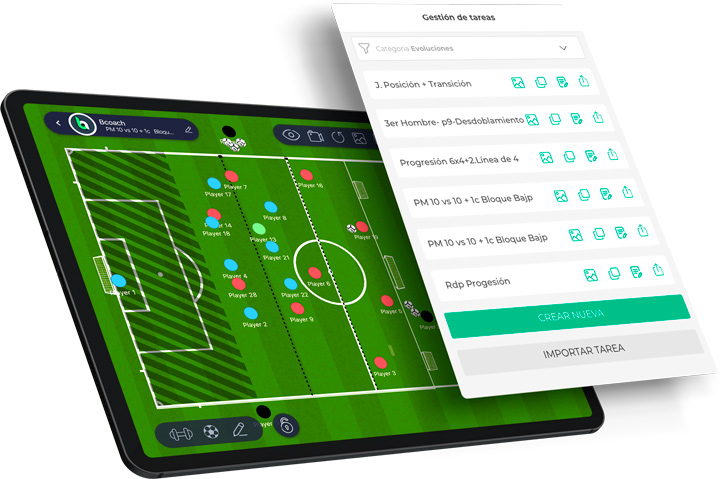
Everyone in the sports industry understands the value of soccer team motivation.
It ensures that your team succeeds at the highest level when combined with a solid technical, tactical, and mental approach.
It is critical that coaches establish certain goals for the following 90 minutes of play before the game begins. However, it is essential that multiple goals be set during the season to improve various complementing components.
For this reason, throughout this article, we are going to unravel the some important tips that will help you know how to motivate a soccer team.
1. Establish attainable short- and medium-term goals.
A good goal setting strategy will prevent feelings such as frustration, anxiety, and helplessness among the players.
We must bear in mind that we must look at them from two perspectives: individual and team.
The individual goals must be centered on strengthening each player’s strengths and negating the acts in which they are less than stellar.
The team’s issues are dealt with by all the members of the staff. We work together to compensate for weaknesses and enhance strengths in order to achieve team motivation.
It is no easy task to get the team to be a perfect team, but it is achieved by knowing each of the players and being very clear about the concepts to be transmitted.

But what do these objectives have to be?
First of all, they must be achievable.
As coaches, understanding soccer team motivation is crucial, and we must be aware of what our teams are capable of, as setting unrealistic targets can result in frustration and negativity both on and off the field.
We must be realistic and analyze whether we have the ability, skills, and time, both individually and collectively, to make them a reality.
The second point of reference is that they must be measurable in order to track their progress from the start of training to the end of the season.
Similarly, the fact that they are measurable offers a morale boost by visually demonstrating how their physical and technical skills have improved.
If progress has not been made, it allows one to analyze and rethink the existing approach to see where it has failed and how it might be improved.
Finally, they must be clear and precise.
If this phase fails, both in explanation and transmission, the outcome will be terrible.
Each input that is delivered at the team must be understood. This is accomplished by not combining objectives and by addressing questions such, “What do we want to achieve?” Who is obligated to do it? How will it be accomplished? How much time do we have to put it into action?
2. Avoid blockages caused by insecurity and fear.
Many athletes are not used to hearing, “You’re not going out on the field today,” or are unable to accept the idea that they did not give their all throughout the day’s practice.
Negative sentiments emerge during a mental slump, which can lead to mental blockage, self-doubt, and an exponential decline in motivation.
A skilled coach should be able to recognize when anything is wrong with a player and intervene.
How can we tackle this significant challenge?
Building on emotional relationships and fostering respect is a fundamental aspect of soccer team motivation. To earn a player’s trust, encouraging them to open up and seek counsel during their lowest moments is pivotal and marks half the job done.
The remaining effort involves consistent and detailed work to sustain motivation within a soccer squad.
Effectively communicating that defeats or challenging days contribute to valuable learning experiences is key. It’s essential to frame these setbacks constructively, emphasizing their role in the growth and improvement of both individual players and the team as a whole.
Analyze all of his motions and growth with him in a visible fashion, such as with a tactical board, and work together on the points to improve.
At the same time, you should work with the entire team on the psychological element. One of the elements that athletes appreciate the most is a sense of belonging, since if one of them falls, his teammates will be there to pick him up.
3. Your biggest weapon is team motivation.
A coach is responsible not just for ensuring that players give their all on the field, but also for guiding them mentally prior to, during, and after the game.
Set reasonable goals and present challenges that will generate passion and a spirit of work through positive messages that will reinforce their values and skills.
This is not to say that corrective instructions should be ignored when the task is not done appropriately. However, a positive or neutral tone of communication must be determined, with specific care paid to how it is communicated.
If you have faith in the team, the team will have faith in you.
Not every coach understands how to encourage soccer team motivation. We usually emphasize working on confidence after many years in the sports sector.
On and off the field, the coach is the authoritative figure who must be respected while issuing commands.
However, it has been demonstrated that a less dictatorial and more collaborative mindset produces better mental results for the participants.
A competent coach begins by attempting to establish a two-way communication thread in which both sides feel comfortable. Sharing points of view, opinions about upcoming activities, or experiences on the field is critical.
The players will see that their coach is aware of their circumstance, and the coach will feel more backed by the squad, and they will almost certainly respond more favorably and effectively to all of his directions. This means they will be more open to instructions and will be more motivated.
However, not all locker rooms are like this, because the coach’s position is determined by the coach and his work ethic. We find certain authoritarian profiles and others that promote bilateral communication; all you have to do is select the one that best fits your personality and the temperament of your soccer team.
4. Motivational team meetings
The goal of these talks is to relieve the player’s head of stresses and responsibilities, allowing them to enter the field concentrated on tactics and all of his energies focused on the game.
The coach’s pre-game words should be concise, straightforward, and not too long in order to avoid saturation, with a tone of voice that does not cause worry or unnecessary strain.
It is time to encourage and provide positive feedback to the team, which can be accomplished by planning ahead of time and avoiding spontaneity.
It conveys the importance of the upcoming match, recounts previous successes, and highlights the team’s strengths as well as those to remember about the opponent.
Whether you want to know how to encourage a youth or elite soccer squad, don’t miss out on the key insights into soccer team motivation! with these motivating talks that put the finishing touches on hundreds of hours of training.
5. Make use of digital technologies.
Visual stimulation is one of the most effective techniques to enhance soccer team motivation. When the players enter the locker room, it is time to begin the tactical conversation. A tour of all the practiced plays that they will need to memorize in order to put them into action on the field.
When the players enter the locker room, it is time to begin the tactical conversation. A tour of all the practiced plays that they will need to memorize in order to put them into action on the field.
A football tacthical app is a must.
You will be able to show them all of the planned strategies, the strengths of each player, and the course of action to take in a more sensory manner.
With Bcoach, you can centralize all responsibilities in a single app and access them as needed, such as during matches or training sessions.

Functions such as the tactical board serve to explain each of your team’s plays in depth through its many ways of visualization of fields, photos of matches, and trainings. Everything is presented realistically so that the player may remember it in a clear and tangible way without losing attention
6. Promote Team Building
Unquestionably, encouraging team spirit is one of the most effective ways to motivate a soccer team.
It has been demonstrated that these behaviors increase attitudes such as teamwork, companionship, motivation, and dedication. Such variables are important both on and off the field.
Furthermore, these activities promote the development of collaborative abilities, ensuring that everyone stays in sync with one another.



